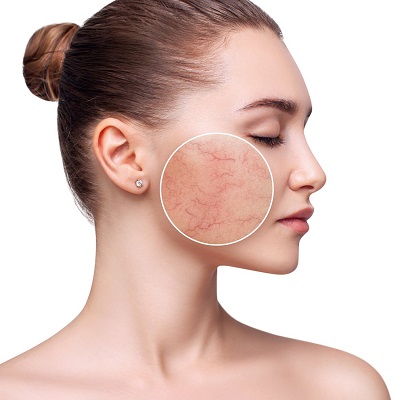
Millions of individuals throughout the world suffer from the prevalent skin illness rosacea. Rosacea, which is characterized by redness, visible blood vessels, and occasionally outbreaks that resemble acne, can make a person feel uncomfortable and self-conscious.
Many people ponder whether there is a permanent treatment for rosacea or if they must live with the condition’s symptoms. The nature of rosacea, treatment choices, and the possibility of long-term relief will all be covered in this blog.
Understanding Rosacea:
Rosacea is a persistent skin disorder that mostly impacts the face. It usually starts after the age of 30 and is more prevalent in people with fair complexion. Although the precise etiology of rosacea is unknown, genetic predisposition, immune system responses, environmental variables including sun exposure, and some triggers (spicy foods, alcohol, temperature changes), are thought to contribute to the condition’s onset.
What Are the Causes?
Factors that are considered to be the causes of rosacea:
● Genetic Influence:
Susceptibility is increased by a family history of rosacea, possibly as a result of blood vessel reactivity.
● Immune System Response:
Inflammation is brought on by an aberrant immunological response, which results in the redness and swelling that are a hallmark of rosacea.
● Demodex mites:
High concentrations of these microscopic mites on the skin may exacerbate immunological responses and inflammation.
● Blood vessel abnormalities:
Rosacea patients’ blood vessels enlarge more easily, resulting in observable redness.
● Environmental Triggers:
The symptoms might be made worse by the sun, severe temperatures, spicy meals, alcohol, stress, and exercise.
● Skin Barrier Impact:
When the skin barrier is compromised, irritants can enter and cause inflammation.
● Gastrointestinal Links:
According to certain research, gastrointestinal problems may be responsible for systemic inflammation that affects the skin.
Available Treatment Options:
While there is no permanent cure for rosacea in Islamabad, there are numerous treatment methods to effectively control its symptoms. These procedures work to lessen redness, irritation, and breakouts while also enhancing the skin’s general comfort and appearance. Typical methods of treatment include:
● Topical Treatments:
Metronidazole, azelaic acid, and brimonidine are among the topical drugs that can help lessen the redness and inflammation brought on by rosacea.
● Oral Medications:
Dermatologists may use oral antibiotics like doxycycline or isotretinoin to treat more serious conditions, reduce inflammation and treat symptoms.
● Laser and Light Therapies:
Targeting visible blood vessels and redness with laser and intense pulsed light (IPL) therapy can give some patients long-lasting improvements.
● Avoiding Triggers:
Flare-ups can be avoided by recognizing and avoiding triggers including hot foods, alcohol, cold weather, and particular skincare products.
Long-Term Management and Lifestyle Changes:
Although there may not be a permanent treatment, many people discover that by making specific lifestyle adjustments and maintaining a regular skincare routine, they can successfully control their rosacea symptoms:
● Sun protection:
Rosacea is frequently brought on by exposure to the sun. Broad-spectrum sunscreen use regularly and wearing protective garments can help stop flare-ups.
● Dietary Considerations:
Even though everyone has different triggers, some people find that staying away from hot foods, alcohol, and caffeine helps them manage their symptoms.
● Stress Management:
Rosacea symptoms can be made worse by stress. Deep breathing and other relaxation practices, including meditation, can be helpful.
● Gentle skincare:
Prevent further discomfort by using gentle, fragrance-free skin care products and avoiding abrasive scrubbing.
The Significance of Professional Guidance:
Rosacea sufferers must get medical advice from a dermatologist. Based on the condition’s severity and the patient’s particular skin type, dermatologists might suggest customized treatment options. While a full recovery could not be assured, good symptom management and symptom reduction are attainable objectives.
The Bottom Line:
Several efficient rosacea treatment options in Islamabad can help manage its symptoms and enhance the quality of life for those who are affected, even though there may not yet be a permanent solution.
People with rosacea can receive long-term relief and maintain healthier, more comfortable skin by combining medicinal therapies, lifestyle changes, and basic skincare.
As each person’s situation is distinct, it is crucial to visit an expert dermatologist at Dynamic Clinic Islamabad for a specific treatment strategy.
Though there may not be a cure for rosacea, its effects can still be properly managed and reduced.
Book a consultation with us right now and avail the expert opinion!

